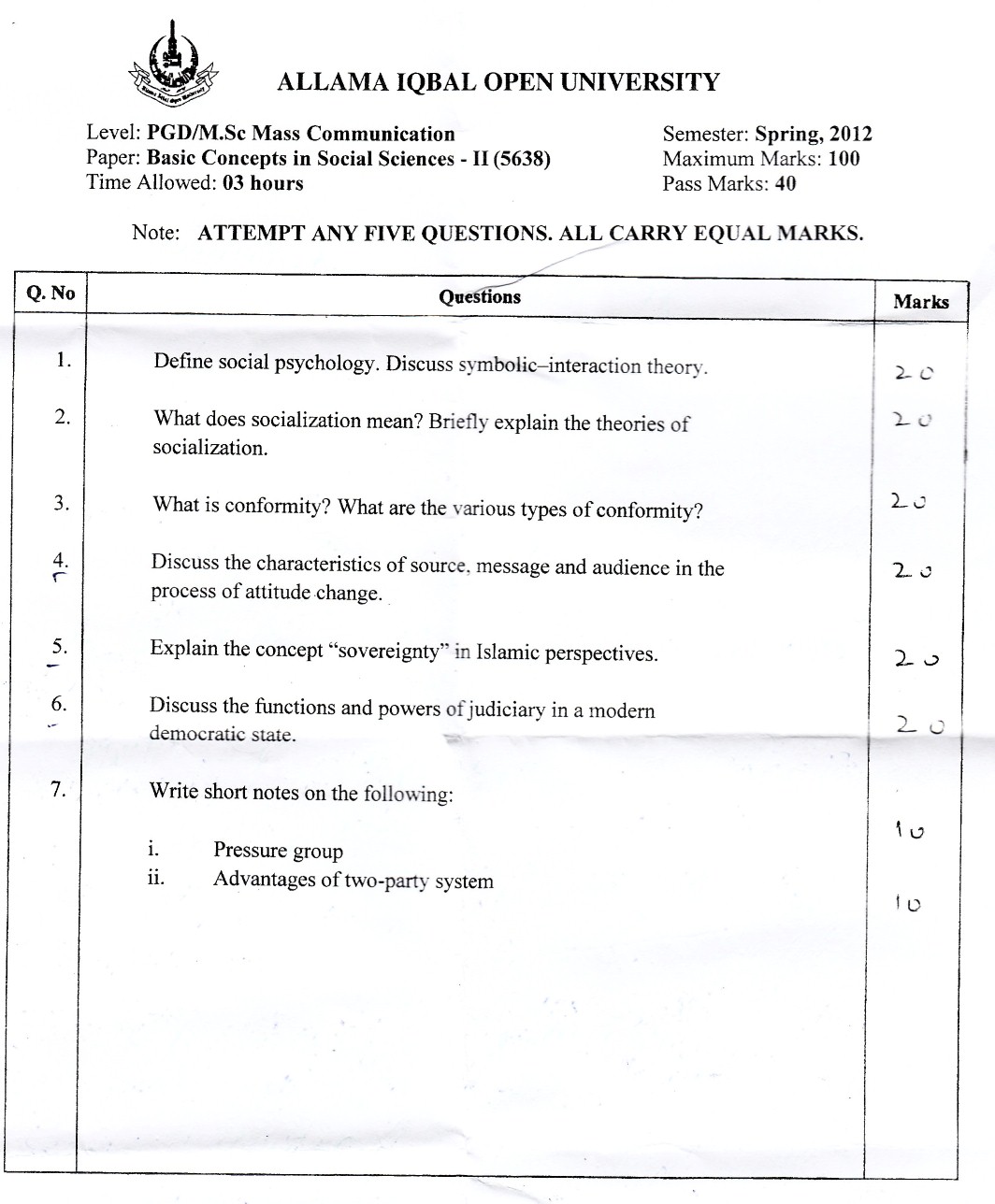ALLAMAIQBAL OPEN UNIVERSITY Level: PGD/M.Sc Mass Communication Paper: Basic Concepts in Social Sciences – II (5638) Semester: Spring, 2012 Maximum Marks: 100 Pass Marks: 40 Time Allowed: 03 hours ATTEMPT ANY FIVE QUESTIONS. ALL CARRY EQUAL MARKS. 1.Define social psychology. Discuss symbolic-interaction theory. 2.What does socialization mean? Briefly explain the theories of socialization. 3.What is conformity? What are the various types of conformity? 4.Discuss the characteristics of source, message and audience in the process of attitude change. 5.Explain the concept of “sovereignty” in Islamie perspectives. 6.Discuss the functions and powers of judiciary in a modern democratic state. 7.Write short notes on the following: i)Pressure group ii)Advantages of two party system
Basic Concepts in Social Sciences -1 CODE: 5637
ALLAMAIQBAL OPEN UNIVERSITY Level: PGD/M.Sc Mass Communication Semester: Spring, 2012 Paper: Basic Concepts in Social Sciences -1 (5637) Time Allowed: 03 hours Maximum Marks: 100 Pass Marks: 40 Note: ATTEMPT ANY FIVE QUESTIONS. ALL CARRY EQUAL MARKS. Q. No. Questions What do you know about sociology? Describe its characteristics and also explain how can we term sociology as a science? Explain the various aspects of culture. How is it different from society? Discuss significance of culture? What is meant by an institution in sociology? What are the basic institutions in • complex societies? What is inflation? What factors cause inflation and how is it controlled? Explain the monetary system by describing bi-metabolism system of note issue and value of money. Define the concept of stock market with special reference to Pakistan. Explain the main features of our economy. What are the obstacles to our economic growth? What […]
Mass Communication Theories-II (5636) Exam Paper 2012
ALLAMAIQBAL OPEN UNIVERSITY Level: PGD/M.Sc Mass Communication Semester: Spring, 2012 Paper: Mass Communication Theories-II (5636) Maximum Marks: 100 Time Allowed: 03 hours _ Pass Marks: 40 Note: ATTEMPT ANY FIVE QUESTIONS. ALL CARRY EQUAL MARKS. Q. No Questions 1 What role groups can play in shaping people’s political attitudes? 2 What does the agenda-setting theory assume? What does the Chappel Hill study concluded about the agenda-setting theory? 3 What do you know about the Knowledge Gap Hypothesis? Do you see any effects of the new technology on the Knowledge Gap Hypothesis? 4 Explain the theory of spiral of silence. 5 What are the main assumptions of the uses and gratifications theory? 6 What are those conditions which scholars consider as the basic requirements for media effectiveness? 7 Write short notes on the following: i. Media determinism ii. Functions of mass communication
Mass Communication Theories-I (5635) Exam Paper 2012
ALLAMAIQBAL OPEN UNIVERSITY Level: PGD/M.Sc Mass Communication Semester: Spring, 2012 Paper: Mass Communication Theories-I (5635) Maximum Marks: 100 Time Allowed: 03 hours Pass Marks: 40 Note: ATTEMPT ANY FIVE QUESTIONS. ALL CARRY EQUAL MARKS. Q. No Questions Marks 1 What does theory-mean in research? What are the concerns of users in mass communication, and how mass communication theories helps us understand these concerns? 20 Discuss the characteristics of scientific method of knowing which differentiate it from other methods of knowledge. 20 3 What do you mean by model? Discuss the criteria of evaluation of a model. 20 4 What techniques are generally used in persuasion? 20 5 Discuss the cognitive dissonance theory in respect to information selection and avoidance. 20 6 What do you know about the characteristics of language? 20 7 Write short notes on the following: i. Induction and deduction in […]
judiciary organization, function and power
Explain judiciary and the rule of law, organization of judiciary, its function and power. The Judiciary: Judiciary is the third organ of the government which is responsible for the administration of justice according, to the law of the .land enacted by the executive and made by the legislature. The concept of the welfare state is directly linked with social justice with impartiality and expeditiousness. An efficient judiciary is necessary for a good governance as it protects the individual rights of people in their public life. An efficient administration of justice maximizes the responsibility of a citizen in a state. It there is no effective judicial system, then there will he no law at all and the principle of “Might is right” will prevail. Severity of punishment does not but certainty of punishment does compel the offenders to abide by law. In ancient times, the executive and judicial function were combined […]
State and its Elements, How the West and Islam see sovereignty?
Define state and its elements. Explain how the West and Islam see sovereignty. Definitions of State: Different scholars have defined “State” differently. Definitions of the few are described below. Aristotle defined it as ” a community of families and villages having for its end a perfect and self-sufficing life, by which we mean a happy and honourable life”. Holland defines the State as “a numerous assemblage of human beings, generally- occupying a certain territory, amongst whom the will of the majority or of an ascertainable class or persons is by the strength of such a majority or class made to prevail against any of their number who oppose it”. Bluntschli holds: “the state is the politically organized people of a definite territory”. Woodrow Wilson defines it simply as “people organized for law within a definite territory”. Maclver defines the state as “an association which, acting through law as promulgated […]
